 This particular lady is one who has come close to being written out of history, and it’s about time she was put back in. It is partly because she is so obscure that I think her movie should be done as a sequel to one on her father, Alfred the Great who, though better known, also deserves more recognition and is definitely worthy of a movie in his own right.
This particular lady is one who has come close to being written out of history, and it’s about time she was put back in. It is partly because she is so obscure that I think her movie should be done as a sequel to one on her father, Alfred the Great who, though better known, also deserves more recognition and is definitely worthy of a movie in his own right.
By the 9th Century AD the southern part of the island of Great Britain had been taken over by Germanic tribes known collectively as the Anglo-Saxons. Missionaries had converted them to Christianity and the original seven kingdoms had merged into three. To the north was Northumbria; to the east and centre was Mercia, which included the area settled by the Angles; Alfred’s kingdom was Wessex, land of the West Saxons, and covered the area to the west and south.
This period is often called the Dark Ages, and when the Great Viking Army arrived in must have seemed to many Christians that it was about to get even darker. The invaders still worshipped old gods such as Tiw (Tyr), Odin (Woden), Thor and Freya who had held sway over Germany and Scandinavia for centuries. [The spelling varied in the different areas, but evidence of their is still to be seen in the days that bear their names; Tuesday, Wednesday, Thursday and Friday.]
From this complex mythology, only the Valkyries survive. They were originally the “shield maidens” of Odin who rode into battles to bring the bravest of the fallen to Valhalla. In modern times they are seem in many forms, standard bearers of a near forgotten culture that have been absorbed into our own. Personally, I’m glad they are still with us, for I rather like them and would love to see a fantasy sequence involving them included in the movie.
The invaders quickly overran Northumbria, although the film would only mention this in passing. It would concentrate on the struggle for survival of the two southern kingdoms against the Danish Vikings, thought of by the monastic chronicles of the time, as the forces of darkness. The Danes also believed in magic, and their mythology was full of tales about rings of power or doom, such as Andvarinaut, a cursed ring that blighted many lives. If all this sounds familiar to Lord of the Rings fans, it is hardly surprising: J.R.R. Tolkien was professor of Anglo Saxon studies at Oxford University.
 While he got his inspiration from many sources (and did not welcome speculation on such matters!), it is, however, hard to ignore certain similarities between Middle Earth and Anglo Saxon England. For example both had: just one woman to fight on horseback; one woman to lead men in battle; one woman to help rule her people when destiny called. Taking everything into consideration, it is quite likely that the legends of Aethelflaed, Lady of the Mercians, inspired Tolkien to crate Eowyn, Lady of the Rohan (left). I do admit, that this similarity seems to relate more to their character, rather than to the lives they led in fact and fiction.
While he got his inspiration from many sources (and did not welcome speculation on such matters!), it is, however, hard to ignore certain similarities between Middle Earth and Anglo Saxon England. For example both had: just one woman to fight on horseback; one woman to lead men in battle; one woman to help rule her people when destiny called. Taking everything into consideration, it is quite likely that the legends of Aethelflaed, Lady of the Mercians, inspired Tolkien to crate Eowyn, Lady of the Rohan (left). I do admit, that this similarity seems to relate more to their character, rather than to the lives they led in fact and fiction.
When Aethelflaed was born in 869 her uncle, Aethelred was King. These were troubled times and Alfred was soon helping his brother lead the army of Wessex against the invaders. The Vikings had been raiding Britain for many years but this army was a much more dangerous proposition – they had come to stay. In 871, Aethelred died of wounds received in battle and Alfred became King. He fought the Danes to a standstill and kept Wessex the only area free of them, but at a heavy price: part of the peace settlement involved paying off the Danes, which Alfred reluctantly did. His little kingdom was exhausted and he knew that if he was killed in battle, there was nobody to follow him. But this only bought him five years. The Danes started encroaching on Wessex and in January 878, launched a winter offensive which took the Saxons completely by surprise. The whole of Wessex was overrun and the royal family was forced to flee, fugitives in their own land.
A lesser man would have quit – the King of Mercia fled to Europe when his kingdom was overrun. Alfred was made of sterner stuff, and this became his finest hour. He went to the Somerset marshes and four months later had transformed a ragged band of followers into an army which defeated the Danes at the battle of Edington. A movie about Alfred would pay particular attention to this period, and I don’t think it unreasonable to assume that Aethelflaed would want to help her father in his time of need. He organised guerrilla warfare against the Danes, and I would include a scene in which eight-year old Aethelflaed spies on them. She is spotted and chased, but gets away. As they give up the chase our little heroine hears them remark; “These Saxon brats are just like their King, good at running and hiding.” We have a close up of a dirty but fiercely determined little face. “When I am grown up, it is you who will be running and hiding from me,” she says passionately.
When Aethelflaed gets back to camp she finds her mother Ealswyth frantic with worry. Everybody had been out looking for her and she was in big trouble – Alfred towers above her, and demands to know where she has been. When he finds out she has been spying on a group of Danes that were in the marshes he is furious, but when he stops yelling long enough to listen he realises that the information his daughter has brought him is extremely valuable. It’s difficult to stay angry with someone of whom you are very proud… After his decisive victory Alfred was able to dictate peace on his terms, which included the partition of Mercia. He achieved a lot, but I don’t anticipate his movie spending much time on them. There would still have been troubles with the Danes, who were a collection of independent bands rather than a true army, as we would understand it.
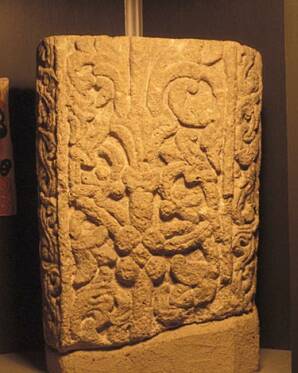
Aethelflaed’s gravecover in Gloucester
At the age of twenty, Aethelflaed married Ethelred, a powerful noble of Mercia and long-time friend of her father. They ruled together, but were never officially known as King and Queen, since many people were still waiting for the return of the King of Mercia from exile. A scene involving Ethelred finding out first hand that she knows how to fight would be a must. I like the idea of them being ambushed while travelling through a forest. Aethelflaed is travelling by wagon but when the Danes attack, her husband ignores her protests and gives her his horse. He tells her to ride on and sends half their bodyguard with her as protection. A short distance away she stops, and notices that the outnumbered Saxons are in trouble. She tries to send the men with her back, but they reluctantly refuse – their orders are to stick with her. Aethelflaed smiles, turns her horse and charges into the fight, picking up a sword from a fallen warrior on the way. The men have no alternative but to follow her; the Danes are taken completely by surprise and after a spirited scrap are beaten off.
Towards the end of the century the Danes attacked again but the combined efforts of Wessex and Mercia drove them back. Alfred was quite sick by this time and although he had organised the defence, such as the creation of a navy, the actual fighting was left to the younger generation. In 899 Alfred died and his son Edward became King of Wessex. The two countries continued to cooperate as before, and together increased the area of Mercia held by the Anglo-Saxons.
 After her husband died in 911, Aethelflaed ruled alone until she died in 918 – he had been sick for some while before this, so in reality she already had the reins. In these last few years she is reported to have led her army in battle against the Vikings, recaptured the town of Derby without a siege, skilfully negotiated treaties with the Danes, Scots and Welsh, and built fortifications – her street plan can still be seen today in the town of Gloucester, where she also rebuilt the Roman walls. Though final victory went to others, without Aethelflaed’s tactical prowess to pave the way, the task of those who followed would have been much harder, if not impossible. [Picture at left is Skeggjold, one of a serious of Valkyrie dolls created by Tanya Van Der Ploeg – for more information visit her website.]
After her husband died in 911, Aethelflaed ruled alone until she died in 918 – he had been sick for some while before this, so in reality she already had the reins. In these last few years she is reported to have led her army in battle against the Vikings, recaptured the town of Derby without a siege, skilfully negotiated treaties with the Danes, Scots and Welsh, and built fortifications – her street plan can still be seen today in the town of Gloucester, where she also rebuilt the Roman walls. Though final victory went to others, without Aethelflaed’s tactical prowess to pave the way, the task of those who followed would have been much harder, if not impossible. [Picture at left is Skeggjold, one of a serious of Valkyrie dolls created by Tanya Van Der Ploeg – for more information visit her website.]
Her daughter briefly ruled after her death, but Edward took over when he found she was not up to the job, and ruled the two kingdoms as one until his death, when his son Aethelstan succeeded him. At a very young age Aethelstan was sent to Mercia where his Aunt Aethelflaed raised him, another potential plot thread. Mercia became his home and it is only natural that he would become their next king – the kingdoms were never separated again. Aethelstan continued the family tradition of gaining land from the Danes and finished up controlling the whole country, having taken over the Danish kingdom centred on York. A good indication of how close he was to his aunt is the statue of Aethelflaed that stands in the grounds of Tamworth Castle. Her right hand firmly grips a sword, but her left arm is protectively draped around the child Aethelstan.
In my view, Alfred, Aethelflaed, Edward and Aethelstan should be looked at collectively as the family that created England as a nation. I have no problem with Alfred becoming known as “The Great”, many years after his death, but think it only fair to point out that without his daughter, son and grandson, his efforts would not have had much lasting effect. Aethelflaed in particular has been relegated to a mere footnote, or worse still completely ignored, and the time is long overdue to do something about it.
A sequel to Alfred’s movie could feature Aethelflaed, though the basis for this would be neither the list of battles fought and fortifications built on the web, nor stuff that I make up. It should be based on the legends of Aethelflaed, which for some reason have been lost over the centuries. When William the Conqueror successfully invaded England in 1066 he cared little for his immediate predecessors, but found many stories still being told of Alfred and his warrior daughter. What better way to legitimise his rule than by marrying Matilda of Flanders, a direct descendant of Elfthryth, Aethelflaed’s sister? This connected William to the legends and enabled his descendants to trace their line right back to Alfred.
I saw one such descendant not long ago, hosting a documentary on the History channel. The credits referred to him as Edward Windsor, but we know him better as Prince Edward, Queen Elizabeth II’s youngest son. Further evidence of his interest in history is the title he took on marriage: Earl of Wessex. His brothers have secondary titles to give their wives rank too, but neither went back over a thousand years to find them. Sounds to me like the right person to go digging in the royal archives, and see if he can find anything about Aethelflaed’s legends…





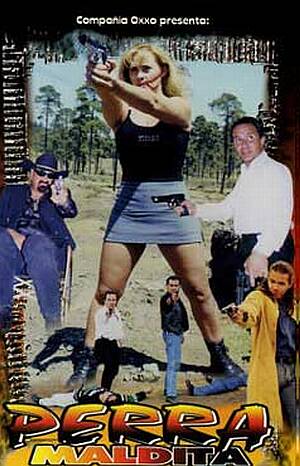 Camelia (Palmer) sees her way out of the ghetto in Ramiro (Saenz), a friend of her father’s who always has more than enough easy money. She convinces him to employ her as an apprentice, but discovers she likes sharing his life of drug-deals and casual slaughter. But they soon find out, they may not be the only ones capable of a good double-cross…
Camelia (Palmer) sees her way out of the ghetto in Ramiro (Saenz), a friend of her father’s who always has more than enough easy money. She convinces him to employ her as an apprentice, but discovers she likes sharing his life of drug-deals and casual slaughter. But they soon find out, they may not be the only ones capable of a good double-cross…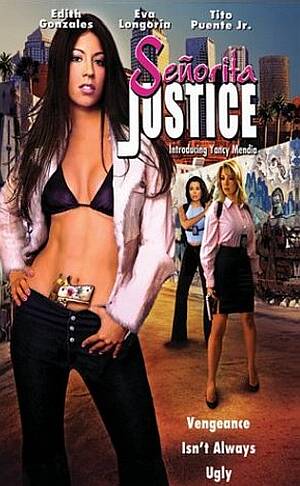 This is an interesting contrast to Sunland Heat which took a woeful script and executed it briskly enough to work. Here, the story isn’t bad – Anna Rios, a Hispanic lawyer (with a special forces background!) goes back to her roots, after her brother is gunned-down, and uncovers a maze of murky deals. It’s the execution which is largely inept, “Kantz” providing further evidence that one-name directors suck at GWG films – see also Charlie’s Angels: Full Throttle (McQ), Catwoman (Pitof), Ecks vs. Sever (Kaos) and Tomb Raider 2 (Jandebont).
This is an interesting contrast to Sunland Heat which took a woeful script and executed it briskly enough to work. Here, the story isn’t bad – Anna Rios, a Hispanic lawyer (with a special forces background!) goes back to her roots, after her brother is gunned-down, and uncovers a maze of murky deals. It’s the execution which is largely inept, “Kantz” providing further evidence that one-name directors suck at GWG films – see also Charlie’s Angels: Full Throttle (McQ), Catwoman (Pitof), Ecks vs. Sever (Kaos) and Tomb Raider 2 (Jandebont). Chagoyan is perhaps the nearest thing Mexico has to offer to an action heroine. She best known for her role in Lola la Trailera (‘Lola the Trucker’), in which, she played the daughter of a haulier – she takes over his business and goes out for vengeance, after he’s gunned down for refusing to assist a drug-cartel. Almost a decade later, that director’s son would helm this, in which Chagoyan plays a teacher who moonlights as a crime-fighting vigilante. Not having seen part one isn’t much of a problem; presumably it explains her origins, and perhaps how she gets to spend so much time away from her job. All we see here is one class, before she and her midget sidekick take on a gang who kill one of her pupils (with a surprising amount of blood, it has to be said). Then, when she’s blamed for kidnapping the daughter of the police chief, she has to find the real culprits and clear her name.
Chagoyan is perhaps the nearest thing Mexico has to offer to an action heroine. She best known for her role in Lola la Trailera (‘Lola the Trucker’), in which, she played the daughter of a haulier – she takes over his business and goes out for vengeance, after he’s gunned down for refusing to assist a drug-cartel. Almost a decade later, that director’s son would helm this, in which Chagoyan plays a teacher who moonlights as a crime-fighting vigilante. Not having seen part one isn’t much of a problem; presumably it explains her origins, and perhaps how she gets to spend so much time away from her job. All we see here is one class, before she and her midget sidekick take on a gang who kill one of her pupils (with a surprising amount of blood, it has to be said). Then, when she’s blamed for kidnapping the daughter of the police chief, she has to find the real culprits and clear her name. This Brazillian-shot entry has a lot of good ideas, and some excellent moments, but comes up short with a script that borders on the incomprehensible. For example, in the middle of the film, the hero and heroine are both shot with tranquilizer darts – but no subsequent mention or explanation of this ever appears. This kind of sloppy plotting plagues the movie; it’s almost half-way through before the basic story becomes clear.
This Brazillian-shot entry has a lot of good ideas, and some excellent moments, but comes up short with a script that borders on the incomprehensible. For example, in the middle of the film, the hero and heroine are both shot with tranquilizer darts – but no subsequent mention or explanation of this ever appears. This kind of sloppy plotting plagues the movie; it’s almost half-way through before the basic story becomes clear.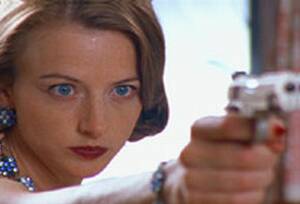 There’s lots to appreciate, not least the actors. As opposed to many films, Hagen here actually looks like she could kick your ass, and the flashback fight sequence is excellent – I’d like to have seen more of that, and all the battles are well staged and shot. While Perry is somewhat bland, he’s effective in action; Richardson is a B-movie veteran for almost two decades (Hollywood Chainsaw Hookers, Attack of the 60-foot Centrefold, etc.), and has a nice, world-weary air here. But Putney (left) is perhaps the best find as Daniel’s gun-toting sidekick, Jackie; the final scene between her and her boss is fabulously intense. And there are other cool little aspects, in things like Daniel’s henchmen.
There’s lots to appreciate, not least the actors. As opposed to many films, Hagen here actually looks like she could kick your ass, and the flashback fight sequence is excellent – I’d like to have seen more of that, and all the battles are well staged and shot. While Perry is somewhat bland, he’s effective in action; Richardson is a B-movie veteran for almost two decades (Hollywood Chainsaw Hookers, Attack of the 60-foot Centrefold, etc.), and has a nice, world-weary air here. But Putney (left) is perhaps the best find as Daniel’s gun-toting sidekick, Jackie; the final scene between her and her boss is fabulously intense. And there are other cool little aspects, in things like Daniel’s henchmen.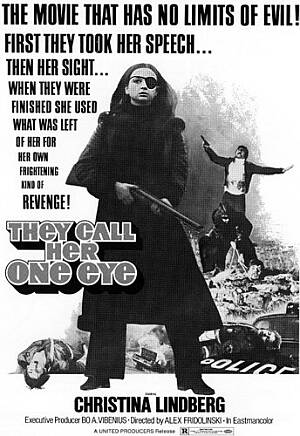
 Right from the first scene, depicting the molestation of a young girl, this is remarkably unrelenting stuff. 15 years later, the heroine (Lindberg), turned mute by her ordeal is kidnapped, turned into a junkie and forced in prostitution. Oh, and had an eye destroyed by her pimp (Hopf) – in loving, close-up, slow-motion that is rumoured to have involved a real corpse – after clawing the face of her first client.
Right from the first scene, depicting the molestation of a young girl, this is remarkably unrelenting stuff. 15 years later, the heroine (Lindberg), turned mute by her ordeal is kidnapped, turned into a junkie and forced in prostitution. Oh, and had an eye destroyed by her pimp (Hopf) – in loving, close-up, slow-motion that is rumoured to have involved a real corpse – after clawing the face of her first client.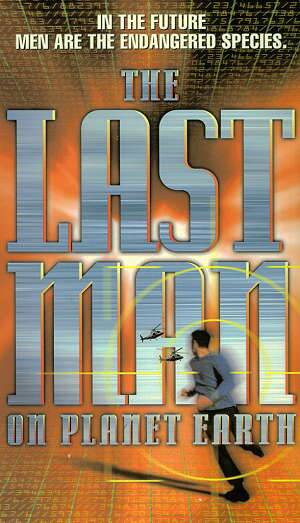 You’ve got to admire any film – particularly a TV movie – that provokes diverse reviews. This, then, not only “
You’ve got to admire any film – particularly a TV movie – that provokes diverse reviews. This, then, not only “